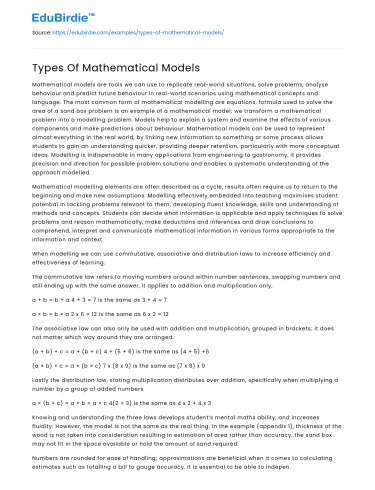Mathematical models are tools we can use to replicate real-world situations, solve problems, analyse behaviour and predict future behaviour in real-world scenarios using mathematical concepts and language. The most common form of mathematical modelling are equations, formula used to solve the area of a sand box problem is an example of a mathematical model; we transform a mathematical problem into a modelling problem. Models help to explain a system and examine the effects of various components and make predictions about behaviour. Mathematical models can be used to represent almost everything in the real world, by linking new information to something or some process allows students to gain an understanding quicker, providing deeper retention, particularly with more conceptual ideas. Modelling is indispensable in many applications from engineering to gastronomy, it provides precision and direction for possible problem solutions and enables a systematic understanding of the approach modelled.
Mathematical modelling elements are often described as a cycle, results often require us to return to the beginning and make new assumptions. Modelling effectively embedded into teaching maximises student potential in tackling problems relevant to them; developing fluent knowledge, skills and understanding of methods and concepts. Students can decide what information is applicable and apply techniques to solve problems and reason mathematically, make deductions and inferences and draw conclusions to comprehend, interpret and communicate mathematical information in various forms appropriate to the information and context.
Save your time!
We can take care of your essay
- Proper editing and formatting
- Free revision, title page, and bibliography
- Flexible prices and money-back guarantee
When modelling we can use commutative, associative and distribution laws to increase efficiency and effectiveness of learning.
The commutative law refers to moving numbers around within number sentences, swapping numbers and still ending up with the same answer, it applies to addition and multiplication only.
a + b = b + a 4 + 3 = 7 is the same as 3 + 4 = 7
a × b = b × a 2 x 6 = 12 is the same as 6 x 2 = 12
The associative law can also only be used with addition and multiplication, grouped in brackets; it does not matter which way around they are arranged.
(a + b) + c = a + (b + c) 4 + (5 + 6) is the same as (4 + 5) +6
(a × b) × c = a × (b × c) 7 x (8 x 9) is the same as (7 x 8) x 9
Lastly the distribution law, stating multiplication distributes over addition, specifically when multiplying a number by a group of added numbers
a × (b + c) = a × b + a × c 4(2 + 3) is the same as 4 x 2 + 4 x 3
Knowing and understanding the three laws develops student’s mental maths ability, and increases fluidity; However, the model is not the same as the real thing. In the example (appendix 1), thickness of the wood is not taken into consideration resulting in estimation of area rather than accuracy, the sand box may not fit in the space available or hold the amount of sand required.
Numbers are rounded for ease of handling; approximations are beneficial when it comes to calculating estimates such as totalling a bill to gauge accuracy. It is essential to be able to independently estimate rather than relying solely on calculators to ensure your answer is likely. When performing calculations using rounding, contextual consideration is important, specifically in the final solution. For example, approximating the amount of sand required to for a path foundation; 78kg of sand is needed and is supplied in pre-packed bags of 30kg, rounding to 80kg means, two bags would be insufficient, three bags are required. Similarly, an answer which suggests 30.247 students can go on a school visit is not a sensible number, contextually interpreting the answer determines 30 students.
Students are often too reliant on calculators which only have the capacity to provide the precise result for the information inputted. Rounding to estimate allows us to surmise if we have arrived at an acceptable solution. For example, a rough estimate of the calculation compared to calculator solution:
9. 317 + 4.972 + 11.005 =
Rounding check: 9 + 5 + 11 = 25
Calculator answer: 25.294
The answers are roughly the same, an incomprehensible answer would lead to re-evaluating inputted data as it is so easy to input incorrect data into a calculator. It is useful to be able to underestimate and an overestimate and check if the solution makes sense. For example, if you share a bill for £40 among three people, and the calculator gives an answer of £13.3333333. How much should be paid by each person? You would probably round up to £13.40 or £15.00 and put the extra in the pot for next time.






 Stuck on your essay?
Stuck on your essay?

